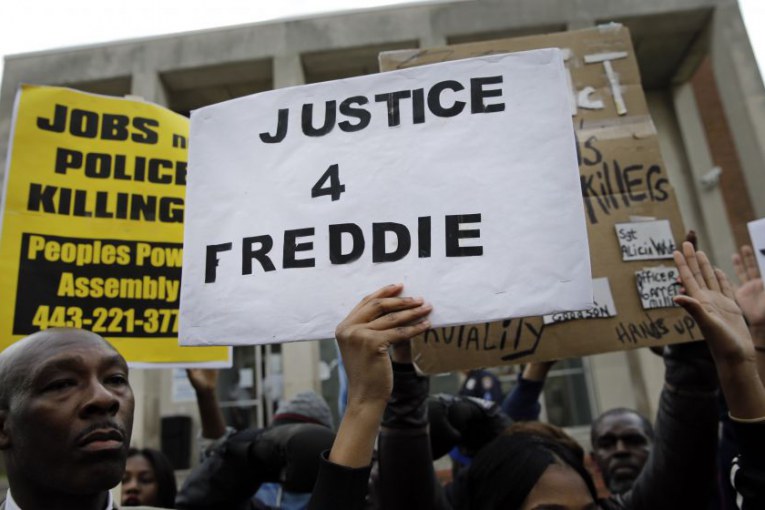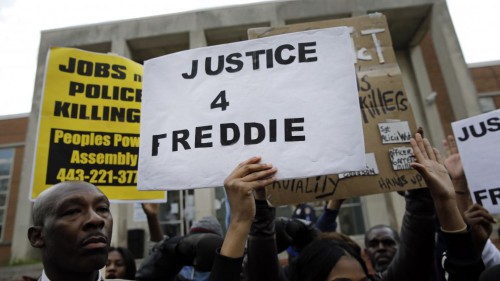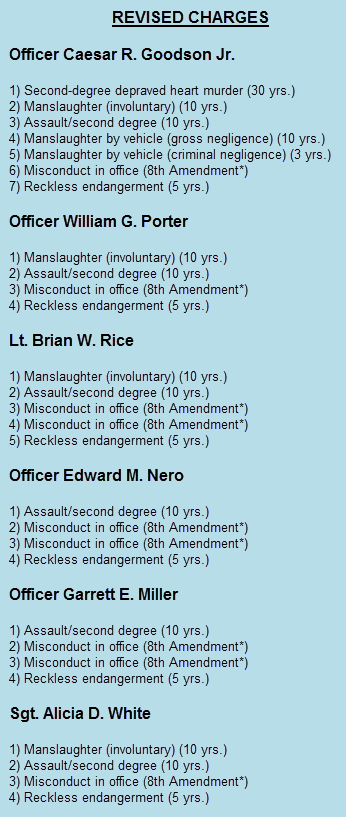

Yesterday, Baltimore State’s Attorney Marilyn Mosby announced that a grand jury had indicted six police officers for the death of Freddie Gray. There were, however, changes to the charges that were announced by the prosecutor a few weeks ago.
Analysis by the Baltimore Sun suggests that “subtle differences after indictment in Gray case could be sign of shift in thinking.”
One of the interesting facets of this case is that the prosecutor opted to go the grand jury route, which would give her more control over the charges, but leave the case shrouded in secrecy – as, clearly, the prosecutor is not willing to put her cards on the table for the public to examine just yet.
The Sun notes, “Baltimore lawyers who are not connected to the case say some of the changes could mean prosecutors are focusing less on Gray’s initial arrest — which State’s Attorney Marilyn J. Mosby said this month was unlawful — while others suggest prosecutors are trying to give themselves a backstop should any part of the case prove faulty.”
The Sun states that the major features of the case have remained the same. Officer Goodson, the one who drove the van, remains accused of second-degree murder and three other officers face the charge of manslaughter.
However, Lt. Rice along with Officer Nero and Officer Miller, all of whom were involved in the initial stop of Mr. Gray, no longer face the charge of false imprisonment. The charge of false imprisonment, while intriguing to many, concerned the arrest itself.
The Sun reported, “Police said it could leave officers worried that an error of judgment might lead to criminal charges.”
Defense attorney A. Dwight Pettit told the Sun a few weeks ago, that he believes the charges were reasonable, however, the charges of false imprisonment were the most unusual. He said, “This is the first instance I have heard of in Maryland of bringing criminal charges for the violation of a citizen’s constitutional rights.”
What is not clear is why the false imprisonment charge disappeared. One person the Sun spoke to, former prosecutor Kurt Nachtman believes that the grand jury did not find grounds to support it.
“You would think if the prosecution handpicked the charges they’d be the same across the board,” he said.
On the other hand, “Page Croyder, another former prosecutor, said it was possible that Mosby’s office decided the false imprisonment charge was a mistake and did not offer it to the grand jury as an option.”
After looking at the legal analysis, we agree – especially since the other charges seem far more important.
Instead, they added the charge of reckless endangerment, a misdemeanor that has a five-year potential sentence in prison.
Ms. Croyder told the paper, “Adding that count — probably a decision made by prosecutors, rather than the grand jurors — gives prosecutors a fallback charge at trial if they struggle to convince a jury of the weightier offenses.”
The Sun writes, “She called reckless endangerment, which means a defendant did something to put someone seriously at risk, a ‘kitchen sink’ charge.”
“This is clearly a shift in strategy by the prosecutor’s office,” Ms. Croyder said. “Adding a charge of reckless endangerment tells me that there are issues about proving the more serious charges.”
The issue of the use of a grand jury itself is interesting.
The Sun notes, “In Ferguson, Mo., a grand jury was allowed to review all the evidence police had collected in the fatal shooting of Michael Brown, and declined to file charges. A grand jury in New York also declined to indict officers in the chokehold death of Eric Garner.”
However, in the Gray case, one local defense attorney believes “it’s unlikely the state’s attorney’s office did much more than call a witness to read a statement of facts in support of the charges.”
“You don’t outline your entire case in front of the grand jury,” he said.
Unless, of course, you want to undermine your case.
In California, Senator Holly Mitchell (D-Los Angeles) has introduced SB 227, a bill to prohibit the use of the criminal grand jury in cases of officer-involved shootings or in cases where excessive force used by an officer results in the death of a suspect.
The complaints about the lack of transparency are well founded. Senator Mitchell’s office noted that, originally, secrecy in grand jury proceedings was intended to protect the reputations of the unindicted individuals accused of crimes whom grand jurors determined should not stand trial.
However, given modern realities, in “today’s world of blogs, lightning-fast news, and video cameras at the touch of a cell phone, the original purpose of the grand jury has lost its meaning.”
The unintentional consequence, the senator said, has become a way to keep citizens from being fully informed and involved in the trials of those peace officers accused of abusing their power.
In the case of Freddie Gray, clearly, officials do not want to release details of the incidents to the public.
The grand jury is rarely used for criminal indictments. In Yolo County, for example, the DA’s office used a grand jury to indict Marco Topete for the 2008 killing of Deputy Sheriff Tony Diaz, however, even in other high profile cases such as the Daniel Marsh case, the DA opted to go the public preliminary hearing route.
Is that a sign of the weakness of the case, as some believe, or an attempt to grow more distance between the civil unrest and the disclosure of critical facts? Only time will tell.
—David M. Greenwald reporting

So now that six Baltimore officers have been indicted is the Vanguard going to now once again rail against the unfair process of the Grand Jury process as it did in the Ferguson case?
Did you read the whole article?
i am very skeptical that she went the grand jury route. is she trying to hide something? papering over a weak case? on the surface, it doesn’t seem that weak. keeping it out of the limelight?
DP,
As a criminal attorney to you agree with my analysis on the California Johnson case and exculpatory evidence in a grand jury. Just curious to see if a you think this layman got it right. Thanks.
there are two issues – the letter of the law versus the application of the law. as a defense attorney, i was never in a grand jury procedure. there’s no requirement for opposing council or provision to allow the accused in or to present a case. so who is going to enforce the provision of exculpatory evidence? it’s hard enough to get ahold of it in a criminal trial where it’s covered under brady.
DP,
Wouldn’t the transcript in this case demonstrate whether known exculpatory evidence that I have identified below was presented to the grand jury?
I would expect a judge to enforce the exculpatory evidence rule upon a request of the defense attorney. The judge would then have to determine if the evidence in question was exculpatory and known to the prosecutor. Based on all of the commentary in this case it was clearly known.
you can look at the transcript after the fact in some cases. but here’s the key point: “I would expect a judge to enforce the exculpatory evidence rule upon a request of the defense attorney.” no, because there’s no defense attorney in the room.
David included the below paragraph in the article.
This appears to be the ham sandwich approach where the prosecutor does not present exculpatory evidence to the grand jury.
There are a number of places where exculpatory evidence that was not presented could put the officers at a disadvantage. The first is the detention. If Mosby did not present evidence the the law that the US supreme court ruled that flight in a high crime area is sufficient for a reasonable suspicion to detain Grey. If no evidence supporting that this occurred in a high crime area would be one example of not presenting exculpatory evidence. The second is that officers are allowed to conduct a search for officer safety reasons during a detention. If this law was not presented to the grand jury it would be a second instance of hiding exculpatory evidence. Third was evidence that the Baltimore Police Homicide task force investigating this case determined that the knife Grey possessed was illegal presented to the grand jury and the applicable law in the Baltimore City code? Fourth, what information concerning the new seat belt policy was presented to the grand jury? Did she simply inform them of the policy and that it was not followed or did she also inform them that it was a new policy that was implemented only days before the Grey arrest? Did she also somehow demonstrate that each of the officers actually was aware of the new policy? A transcript of the proceedings would shed light on these issue. It appears that Mosby used the grand jury to avoid having to litigate these issues in front of a judge in the preliminary hearing that was scheduled for May 27th.
As I noted in great detail in the last article on the Baltimore case prosecutors in California have a legal obligation to advise the grand jury of the existence of any exculpatory evidence. If Reisig did not do this in a Yolo County case David would be screaming prosecutorial misconduct far and wide. This exculpatory evidence rule requires that prosecutors be held to a higher ethical standard here in California. I would think that prosecutors who are ethical in other states would present all relevant exculpatory evidence in the pursuit of justice and not just the minimum evidence supporting the charges as Mosby appears to have done to move this case along.
The other issue that puts Mosby in a poor ethical position was her claims that the Ferguson case should have gone to a preliminary hearing instead of in the secrecy of a grand jury proceeding. The preliminary hearing allows the public to observe the case in court and have a better understanding of the facts supporting the charges. It also puts a neutral judge in charge of the decision. So it would be fair for me to allege that Mosby unethically took the case to the grand jury to avoid any exculpatory evidence that would tend to support the innocence of officers Nero and Miller in the detention and arrest of Grey. The indictment thus does nothing to support the original charges other than a procedural point and does nothing to support the validity of the charges. All the indictment does is support her very political agenda. It will be interesting if she is removed from the case and to see whether it stays in Baltimore county or is moved to another county due to the publicity.
Remember a prosecutor can often get a grand jury to indict a ham sandwich but it is much more difficult to get a jury to convict the same ham sandwich.